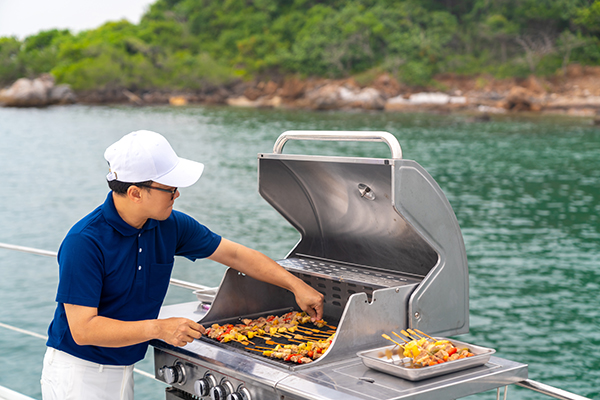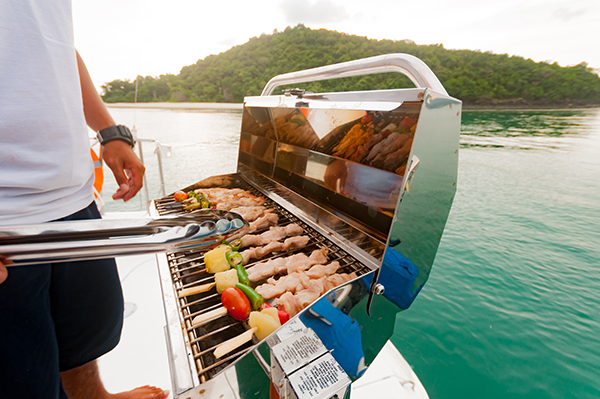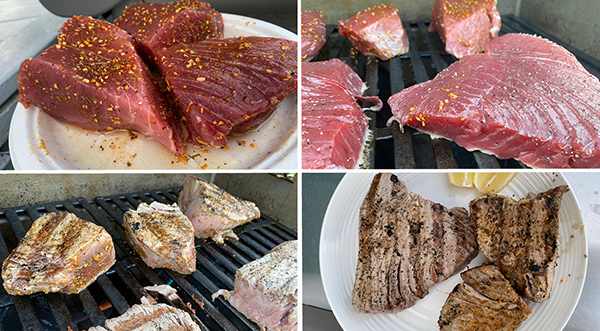The following questions have the same answer:
• What’s better than a backyard barbecue?
• What’s more enjoyable than eating cold sandwiches on the boat?
• What’s a tried-and-true way to make a day on the water even more fun and enjoyable?
The answer to all these questions: grilling on your boat! Boat grills are great. They make possible a variety of culinary experiences. With a few basics and a bit of preparation anyone can be an on the water grill master. What follows is our guide to boat grilling. It comes in three parts: safety, choosing the right grill for your boat, and tips for how to do it.

Safety
Safety is the most important consideration. In the case of boat grilling, there are two main variables. First, and most importantly, only use grills that are made to be used on boats. And only use them in places that are far removed from flammable objects and your fuel tank.
Most boat grills utilize self-enclosed propane tanks. These are great because they are small, compact and if you store them appropriately, they won’t leak. You can buy a multi-pack of the small, portable tanks. These are a great option because not only can you store them for long periods of time, they are not heavy and don’t take up much space.
Never grill in the cabin or salon of the boat. Not only do you run fire risks, but burning propane indoors can create noxious gases.
The third safety consideration involves ensuring that your grill is properly mounted before you ignite it. You don’t want to run the risk of a hot grill, full of hot food falling overboard or onto the gel coat or worse yet, some of your boat guests.
How to Buy the Right Grill for Your Boat
Buying the right grill for your boat starts with considering your boat itself. Where will you mount the grill while you’re using it? How much room do you have to store it while in transit?
Some boat grills are mounted onto rod holders. These options provide a wide range of benefits. First, when properly mounted they are secure. Secondly, they keep the heat and food off the deck and allow more space for people to walk (with less risk of tripping over the grill). This mounting option also makes for easier cleanup, as you run less risk of dripping grease onto your boat.
There are also a variety of grills that operate from the deck of your boat. These are good options if your boat does not have rod holders or if you prefer this style. When you mount them, be sure the feet are stable (if it’s rough or you want an extra bit of peace of mind, you can pick up a dedicated grill pad). A non-slip pad beneath your grill will not only help keep the grill in place, but it will protect the deck of your boat from scratches or grease smudges.
Also consider your fuel source. Boats that have generators can operate electric grills that are corded. If your boat runs its own power, these grills allow you to cook on the boat without need of external power source.
Whichever power option you choose, consider the grill’s portability. This involves finding the best combination of size, durability and ease of transport. You’ll want something that is heavy-duty enough to last, but that is light enough to carry with you. You’ll also want to consider not just where you’ll operate the grill, but where you’ll store it.
If you plan to keep the grill on the boat, measure your proposed storage area and compare that to the grill dimensions. Doing this before you buy the grill will save a potential headache.

Tips for Enjoying A Great Boat Grilling Experience
Most of the time you are grilling on the boat, you’re trying to make a tasty meal in a hurry. For most people, the best things to grill are those that you can cook quickly. This often means hamburgers, hot dogs, brats, chicken breasts, or fish fillets.
The good thing about these items is that they cook fast and you can be reasonably sure when they are done. People unfamiliar with grilling might be surprised at how long bone-in chicken legs take to cook. If you plan to grill ribs on the boat, just be aware that they will take longer than burgers and hot dogs.
You can also speed up your grilling experience (and make for prettier plates of food) by doing the prep work at home. This might mean popping precut slices of lettuce or veggie sticks into resealable bags. It could also mean starting to marinate your meats at home—you can just pop the container into the cooler.
You can also create your own dedicated boat grilling kit. This might include utensils, Tupperware, a bag of spices—salt, pepper, barbeque and hot sauces, etc. You can keep this back stocked and ready. Think of it kinda like a boat grilling tackle box. If you want to take it a step further, you can even have your own dedicated plates and dishes.

The Perfect Boat-Grilled Tuna
Perhaps the most iconic thing to grill aboard your boat is a fish that you caught on it. The following recipe works with many kinds of fish—mahi-mahi, tuna, wahoo, kingfish and more. These photos are bluefin tuna.
The first thing you do is to cut the fillet into uniform pieces. This will ensure that they cook evenly. Next, brush a layer of olive oil onto the fillets. Season with salt and pepper (or whatever you like—Cajun seasoning, add some hot sauce, literally you name it).
When the grill is hot, place the oiled and seasoned fish fillets onto the grill. Cook four minutes per side and flip. Grill four another four minutes.
The duration of cooking depends on the thickness of the fillets and the heat of the grill. For thinner fillets check it sooner. You’ll know when the fish is getting done because white fish will begin to flake. You can always test doneness by cutting into one of the fillets.
Once they’re cooked, you can finish the fillets with a bit of lemon juice. You can eat them as the star of a sandwich or by themselves. Enjoy.
Back to Blue Life
• What’s better than a backyard barbecue?
• What’s more enjoyable than eating cold sandwiches on the boat?
• What’s a tried-and-true way to make a day on the water even more fun and enjoyable?
The answer to all these questions: grilling on your boat! Boat grills are great. They make possible a variety of culinary experiences. With a few basics and a bit of preparation anyone can be an on the water grill master. What follows is our guide to boat grilling. It comes in three parts: safety, choosing the right grill for your boat, and tips for how to do it.

Safety
Safety is the most important consideration. In the case of boat grilling, there are two main variables. First, and most importantly, only use grills that are made to be used on boats. And only use them in places that are far removed from flammable objects and your fuel tank.
Most boat grills utilize self-enclosed propane tanks. These are great because they are small, compact and if you store them appropriately, they won’t leak. You can buy a multi-pack of the small, portable tanks. These are a great option because not only can you store them for long periods of time, they are not heavy and don’t take up much space.
Never grill in the cabin or salon of the boat. Not only do you run fire risks, but burning propane indoors can create noxious gases.
The third safety consideration involves ensuring that your grill is properly mounted before you ignite it. You don’t want to run the risk of a hot grill, full of hot food falling overboard or onto the gel coat or worse yet, some of your boat guests.
How to Buy the Right Grill for Your Boat
Buying the right grill for your boat starts with considering your boat itself. Where will you mount the grill while you’re using it? How much room do you have to store it while in transit?
Some boat grills are mounted onto rod holders. These options provide a wide range of benefits. First, when properly mounted they are secure. Secondly, they keep the heat and food off the deck and allow more space for people to walk (with less risk of tripping over the grill). This mounting option also makes for easier cleanup, as you run less risk of dripping grease onto your boat.
There are also a variety of grills that operate from the deck of your boat. These are good options if your boat does not have rod holders or if you prefer this style. When you mount them, be sure the feet are stable (if it’s rough or you want an extra bit of peace of mind, you can pick up a dedicated grill pad). A non-slip pad beneath your grill will not only help keep the grill in place, but it will protect the deck of your boat from scratches or grease smudges.
Also consider your fuel source. Boats that have generators can operate electric grills that are corded. If your boat runs its own power, these grills allow you to cook on the boat without need of external power source.
Whichever power option you choose, consider the grill’s portability. This involves finding the best combination of size, durability and ease of transport. You’ll want something that is heavy-duty enough to last, but that is light enough to carry with you. You’ll also want to consider not just where you’ll operate the grill, but where you’ll store it.
If you plan to keep the grill on the boat, measure your proposed storage area and compare that to the grill dimensions. Doing this before you buy the grill will save a potential headache.

Tips for Enjoying A Great Boat Grilling Experience
Most of the time you are grilling on the boat, you’re trying to make a tasty meal in a hurry. For most people, the best things to grill are those that you can cook quickly. This often means hamburgers, hot dogs, brats, chicken breasts, or fish fillets.
The good thing about these items is that they cook fast and you can be reasonably sure when they are done. People unfamiliar with grilling might be surprised at how long bone-in chicken legs take to cook. If you plan to grill ribs on the boat, just be aware that they will take longer than burgers and hot dogs.
You can also speed up your grilling experience (and make for prettier plates of food) by doing the prep work at home. This might mean popping precut slices of lettuce or veggie sticks into resealable bags. It could also mean starting to marinate your meats at home—you can just pop the container into the cooler.
You can also create your own dedicated boat grilling kit. This might include utensils, Tupperware, a bag of spices—salt, pepper, barbeque and hot sauces, etc. You can keep this back stocked and ready. Think of it kinda like a boat grilling tackle box. If you want to take it a step further, you can even have your own dedicated plates and dishes.

The Perfect Boat-Grilled Tuna
Perhaps the most iconic thing to grill aboard your boat is a fish that you caught on it. The following recipe works with many kinds of fish—mahi-mahi, tuna, wahoo, kingfish and more. These photos are bluefin tuna.
The first thing you do is to cut the fillet into uniform pieces. This will ensure that they cook evenly. Next, brush a layer of olive oil onto the fillets. Season with salt and pepper (or whatever you like—Cajun seasoning, add some hot sauce, literally you name it).
When the grill is hot, place the oiled and seasoned fish fillets onto the grill. Cook four minutes per side and flip. Grill four another four minutes.
The duration of cooking depends on the thickness of the fillets and the heat of the grill. For thinner fillets check it sooner. You’ll know when the fish is getting done because white fish will begin to flake. You can always test doneness by cutting into one of the fillets.
Once they’re cooked, you can finish the fillets with a bit of lemon juice. You can eat them as the star of a sandwich or by themselves. Enjoy.
